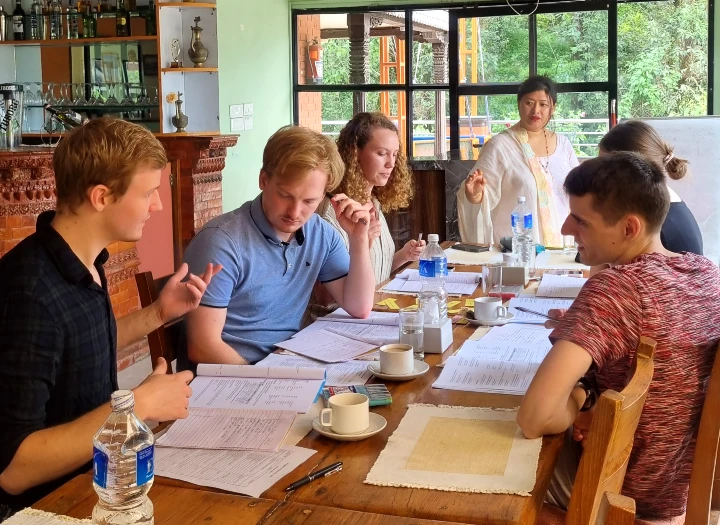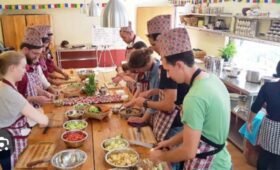Nepal, nestled in the lap of the Himalayas, is a land of diverse cultures, breathtaking landscapes, and warm-hearted people. It’s a destination that beckons adventurers, researchers, volunteers, and development associates from around the world. While the natural beauty is a major draw, truly immersing oneself in Nepal’s tapestry requires more than just a visit. It demands understanding, and that’s where Real Journey Nepal’s Nepali language and cross-culture training courses come into play.
Nepal’s Call
People from all corners of the globe are drawn to Nepal for a myriad of reasons. Adventurers seek to conquer towering peaks, researchers aim to unlock the secrets of the Himalayas, volunteers aspire to make a positive impact, and development associates work on sustainable initiatives. Regardless of their motivation, understanding Nepal and its people is essential for the success of their endeavors.
Real Journey Nepal: Beyond Trekking
Real Journey Nepal is renowned for its treks and expeditions in the Himalayan region. But the organization offers more than just physical journeys; it provides intellectual and cultural journeys. This is where the Nepali language and cross-culture training courses come into play. Real Journey Nepal recognized the need for a comprehensive program that would not only help foreign associates communicate effectively but also appreciate and respect the local customs and traditions.
The Power of Language
Language is the key to understanding any culture. For foreign development associates, expatriates, overseas volunteers, and research students, acquiring proficiency in the Nepali language is a bridge to the heart of Nepal. It’s the means to connect with locals, learn from them, and immerse in the culture.
Real Journey Nepal’s Nepali language classes are tailored to the specific needs and objectives of participants. Whether you’re aiming to work on a development project, volunteer in a remote village, or conduct research in the Himalayan region, language is the foundation. These classes not only teach vocabulary and grammar but also help participants grasp the nuances of communication in the Nepali context.
Cross-Culture Training: Beyond Words
Understanding a culture is more than just knowing the language. It’s about comprehending the customs, traditions, values, and daily life of the people. Real Journey Nepal’s cross-culture training goes beyond words, delving into the heart of Nepali culture.
What’s Covered in Cross-Culture Training?
1. Customs and Traditions: Participants gain insight into the various customs and traditions prevalent in Nepal, from rituals and festivals to everyday practices.
2. Etiquette: Proper etiquette is crucial in any culture. Participants learn how to conduct themselves respectfully in different situations.
3. Social Norms: Understanding the social norms helps participants navigate social interactions with ease and grace.
4. Daily Life: From what Nepali people eat to how they dress, participants get a detailed look at the daily life of locals.
5. Cultural Sensitivity: Learning to be culturally sensitive is a core part of the training. It promotes respect and appreciation for the host culture.
6. Historical and Societal Context: The course delves into the historical and societal context of Nepal, providing a comprehensive understanding of the country’s evolution.
Realizing Objectives in Nepal
The primary goal of the Nepali language and cross-culture training offered by Real Journey Nepal is to empower foreign associates to achieve their objectives in Nepal. Let’s take a closer look at how these courses contribute to the success of various individuals:
Development Associates
Development associates working on projects in Nepal often have the noble aim of creating positive and sustainable change. The ability to communicate with local stakeholders, understand their needs, and collaborate effectively is vital. The Nepali language classes provide the linguistic tools for communication, and the cross-culture training ensures they approach their projects with sensitivity to local customs and traditions. This combination significantly increases the chances of project success and community acceptance.
Expatriates
Expatriates moving to Nepal for work or personal reasons find that integrating into a new culture can be challenging. Learning the language is the first step to becoming part of the community. The cross-culture training, on the other hand, helps expatriates navigate everyday life, build meaningful relationships, and understand the dynamics of their new home. This results in a more enriching experience and a smoother transition.
Overseas Volunteers
Volunteers often come to Nepal with a deep desire to make a difference in the lives of local people. The Nepali language classes enable them to communicate with the communities they serve and understand their needs better. This linguistic bridge creates a stronger connection and fosters trust. The cross-culture training, meanwhile, ensures that volunteers respect local customs and traditions, fostering a more harmonious relationship with the community.
Research Students
Research students conducting studies in Nepal benefit immensely from language proficiency. It allows them to communicate with research participants, conduct interviews, and gather data effectively. The cross-culture training is equally vital as it helps students understand the context in which their research is situated. It allows for a more nuanced and respectful approach to data collection.
What Sets Real Journey Nepal’s Training Apart?
Real Journey Nepal’s Nepali language and cross-culture training courses stand out for several reasons:
- Customization: The courses are tailored to the specific needs and objectives of participants, ensuring they gain the knowledge and skills required for their endeavors.
- Experienced Instructors: Participants are taught by experienced instructors who understand the nuances of language and culture.
- Practical Application: The courses emphasize practical application, allowing participants to immediately apply what they’ve learned.
- Cultural Immersion: Training often includes immersive experiences such as homestays and cultural activities, providing a firsthand look at Nepali life.
- Flexibility: Real Journey Nepal understands the busy schedules of its participants, and the courses can be adapted to fit individual timelines.
- Comprehensive Learning: The combination of language and cross-culture training creates a holistic understanding of Nepal and its people.
Success Stories
The impact of Real Journey Nepal’s training courses is best reflected in the success stories of those who have participated. Here are a few examples:
Sarah’s Sustainable Project: Sarah, a development associate, worked on a sustainable agriculture project in a remote Nepali village. Her language proficiency and cultural sensitivity not only facilitated communication with the local farmers but also gained their trust. The project was a success, improving the livelihoods of the community.
Tom’s Himalayan Research: Tom, a research student, conducted a study on climate change in the Himalayas. His language skills enabled him to engage with local communities and gather valuable data. The cross-culture training ensured he approached his research with cultural sensitivity, fostering cooperation among the locals.
Maria’s Volunteer Journey: Maria, a volunteer, spent six months teaching English in a Nepali school. Her language proficiency made it easier to connect with the students, and her understanding of Nepali culture allowed her to integrate seamlessly into the community. Her impact on the students’ education and well-being was profound.
Making Time in Nepal Comfortable and Enjoyable
One of the key outcomes of Real Journey Nepal’s training is that it makes time in Nepal not only productive but also comfortable and enjoyable. Participants feel more at home, have meaningful interactions, and experience the warmth of Nepali hospitality.
Conclusion
Nepal is a land of endless opportunities and incredible experiences, but unlocking its treasures requires more than just a visit.



